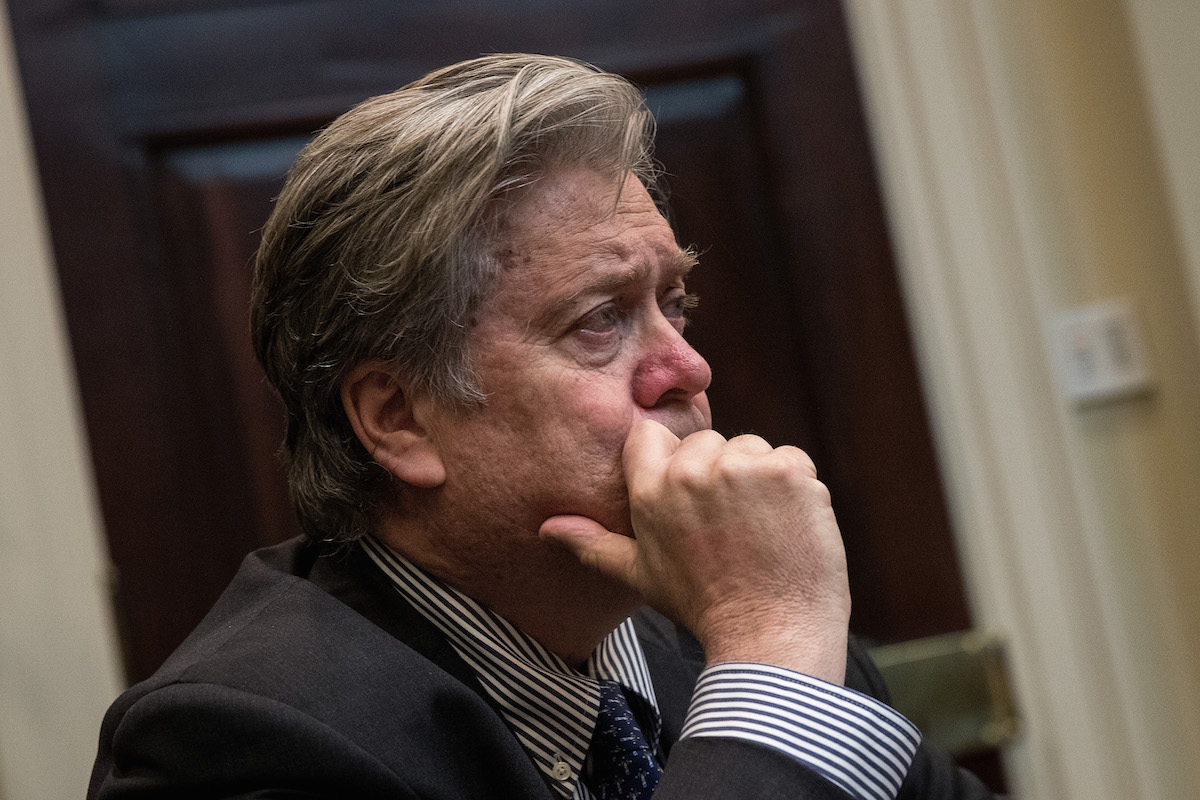
When Steve Bannon joined Donald Trump’s campaign months ago, I recalled an encounter I had with him eight years earlier. Writing in November, after he was appointed to the White House staff, I described how Bannon had interviewed me for a documentary film he made in 2009. Our conversation took on a worrying layer of meaning given Bannon’s new political power, and events of the last two weeks have confirmed the historical role he wants to play.
The film, Generation Zero, which can be viewed on YouTube, was largely based on a theory laid out by William Strauss and Neil Howe in the 1990s in two remarkable books, Generations and The Fourth Turning. Bannon interviewed both Neil Howe and myself at length (Bill Strauss had died in 2007) about its implications for the immediate future. Looking at the whole sweep of American history, Strauss and Howe realized that a great crisis, involving the death of an old order and the birth of a new one, had occurred every 80 years at least since the 18th century. These crises included the period of the American Revolution and the Constitution (1774-1794), the Civil War (about 1860-1868), and the Depression and the Second World War (1929-1945). Doing the math, they predicted a fourth great crisis—or “fourth turning”—sometime in the first 15 years of the 21st century. While they were far too wise to attempt to predict exactly what might trigger it or what course it might take, they listed terrorism, financial crises and federal-state conflicts as possible events that might begin the new era. Their prediction has come true.
This theory, which never really caught on in the media or in academia, is something I have tried to introduce to readers in various posts here over the past three years and in numerous posts since 2004 at my personal website, and in books on the Vietnam War and U.S. entry into the Second World War. In the piece about my conversation with Bannon, I discussed two particular aspects of our discussion about Strauss and Howe—our conversations about the wars that had accompanied the last of America’s three great crises, and my realization that other nations had not come through their moments of crisis as well as ours had.
Since then, it has become even clearer that Bannon sees this moment as a crisis of the sort Strauss and Howe described. “What we are witnessing now,” he wrote this week in an email to the Washington Post dealing with the outcry against the immigration order, “is the birth of a new political order, and the more frantic a handful of media elites become, the more powerful that new political order becomes itself.”
He has a point. Many people in the major media, academia and Democratic politics cannot imagine alternatives to the status quo. They simply could not believe that something like Trump’s immigration order would go through, because it was antithetical to their values. The election, however, already showed that their values, while shared by most of the population in the blue states, are not consensus values. Some polls have shown that a majority of American voters supported the idea of Trump’s immigration order. Trump’s opponents are now in a fight for their political lives. To paraphrase FDR, they hate Trump — and he welcomes their hatred. Meanwhile, Trump — like Lincoln and FDR — is now also a leader of a worldwide movement: the populist nationalism that already rules Russia and Turkey, contributed to the Brexit vote in Britain, and will soon be tested in France and Germany.
No one can predict the outcome of the next four years, but the preservation of the status quo does not seem to be any more of an option than it was in 1861 or 1933.
In one scenario, Trump, Bannon and the Republicans may not only eliminate much of the federal government but truly break the political influence of the educated blue-state elites, reducing them to local powers in certain regions, like the Federalists after 1801 or white southerners after 1868. Another more chilling scenario would echo the Civil War in a different way, involving actual conflict between federal and local authorities over a topic like immigration, which might easily ignite the talk of blue-state secession that has already started on the west coast. Alternatively, the Administration may not be able to survive what may be its greatest vulnerability—Trump’s own leadership, which, it has been widely reported, has bred chaos in the White House, the consequences of which cannot be predicted. Or, as happened in the most recent American crisis, the nation may become involved in a confrontation and war with a foreign power, with utterly uncertain results. And it remains possible that the effects of climate change will become so obviously threatening that even Trump may have to decide to do something about it.
In none of these cases will the United States resemble what we have come to know over the last two decades. Even if a Democrat wins the White House in 2020, he or she will head a very different nation.
Nothing in Strauss and Howe’s ideas favored a right-wing outcome to our current crisis. I thought eight years ago that Barack Obama was going to revive the New Deal, but he chose not to do so. He very consciously declined to mobilize the anger in the country to set one group of Americans against another—a feature of previous fourth turnings. The Tea Party and the Republican Party filled the vacuum, and the Trump campaign piggy-backed on what they had done.
Bannon is where he is, and can do what he is doing, partly because he took the trouble to read The Fourth Turning. Those who want the next few years to turn out differently than he does would do well to do the same.

Historians explain how the past informs the present
David Kaiser, a historian, has taught at Harvard, Carnegie Mellon, Williams College, and the Naval War College. He is the author of seven books, including, most recently, No End Save Victory: How FDR Led the Nation into War. He lives in Watertown, Mass.
More Must-Reads from TIME
- Donald Trump Is TIME's 2024 Person of the Year
- Why We Chose Trump as Person of the Year
- Is Intermittent Fasting Good or Bad for You?
- The 100 Must-Read Books of 2024
- The 20 Best Christmas TV Episodes
- Column: If Optimism Feels Ridiculous Now, Try Hope
- The Future of Climate Action Is Trade Policy
- Merle Bombardieri Is Helping People Make the Baby Decision
Contact us at letters@time.com